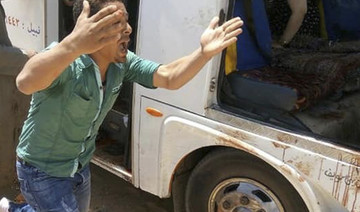MINYA: Angry Coptic Christians on Saturday buried relatives shot dead on a bus carrying pilgrims south of the Egyptian capital, the second such terrorist attack on the country’s main religious minority in as many years.
Daesh said it was behind Friday’s attack which killed seven Christians returning from a visit to the desert cemetery of Saint Samuel that was also targeted in 2017.
A security source said another seven people were wounded in the shootings near the city of Minya.
Hundreds of angry Copts gathered in and around Minya’s Prince Tadros Church from dawn for the funeral of six victims, under heavy guard by masked security personnel.
The seventh victim, an Anglican, was buried on Friday evening in a village outside Minya.
After Saturday’s prayers, the bodies were carried out in white coffins bearing wreaths of white flowers.
They were being buried in a nearby Coptic cemetery.
“We will not forget the promises of officials, including the president of the republic, that the criminals will be punished,” Bishop Makarios of Minya said in an address to mourners.
Members of the crowd, however, booed as he thanked security officials.
Many Copts accuse authorities for not doing enough to protect them, following a string of attacks that have killed over 100 members of their community since 2011.
Dozens of victims’ family members had waited throughout Friday night outside Minya’s main hospital to receive the bodies for burial.
Scene of shooting
An elderly woman wept for her dead son and wailed as she sat on the ground outside the hospital morgue.
“He was the best child... I’ll never see him again,” she said, as other mourners rushed to carry a coffin to an ambulance to be taken to a church for a funeral.
Security forces remained on the alert outside the hospital for fear of further attacks, while roads were blocked to the scene of the shooting. Bishop Makarios visited the hospital to try to comfort mourners.
Another Coptic cleric, asking not to be named, said around 24 people had escaped the attack unharmed and spent the night at a church in a nearby village.
“Should I carry a gun with me when I go to pray or when I’m at home? Because I could die if I go to church,” said Michel, a 23-year-old Copt whose neighbor was killed in the attack.
He said three of the victims had been siblings.
“What do these terrorists want? Do they want us to hate Muslims?“
On Saturday, a burned-out four-wheel-drive truck, which witnesses said had been used by a group of militants in white galabiya gowns, stood near the site of the attack.
Residents had attacked the car and handed two of its occupants to security forces, they said.
As Egypt’s Christians reeled from the latest attack, President Abdel Fattah El-Sisi called Coptic Pope Tawadros II to offer his condolences and led a minute of silence at a youth forum he was attending.
Copts, a Christian minority that make up 10 percent of Egypt’s 96 million people, have in recent years been repeatedly targeted by terrorists.
In May 2017, masked gunmen ordered Christians traveling to Saint Samuel to get off their buses and recant their faith. The group refused and were shot one by one, leaving 28 people dead in the Daesh-claimed attack.
Daesh also killed more than 40 people in twin church bombings in April 2017, and a Daesh gunman last December killed nine people in an attack on a church in a south Cairo suburb.
Egypt’s army launched a major offensive in February 2018 against Daesh in the Sinai Peninsula, where the group has waged a deadly insurgency since the fall of Mohammed Mursi in 2013, killing hundreds of soldiers and policemen.
The military offensive — Dubbed “Sinai 2018” — has killed more than 450 terrorists, according to an army estimate, with around 30 soldiers killed.
“This latest attack shows that the anti-Daesh campaign has not yet succeeded in Egypt, despite obvious efforts by the authorities to tackle it in different parts of the country,” said H. A. Hellyer, senior non-resident fellow at the Atlantic Council and the Royal United Services Institute in London.
Copts have long complained of discrimination in Egypt and Daesh is not the only group to have launched sectarian attacks against the community.
























